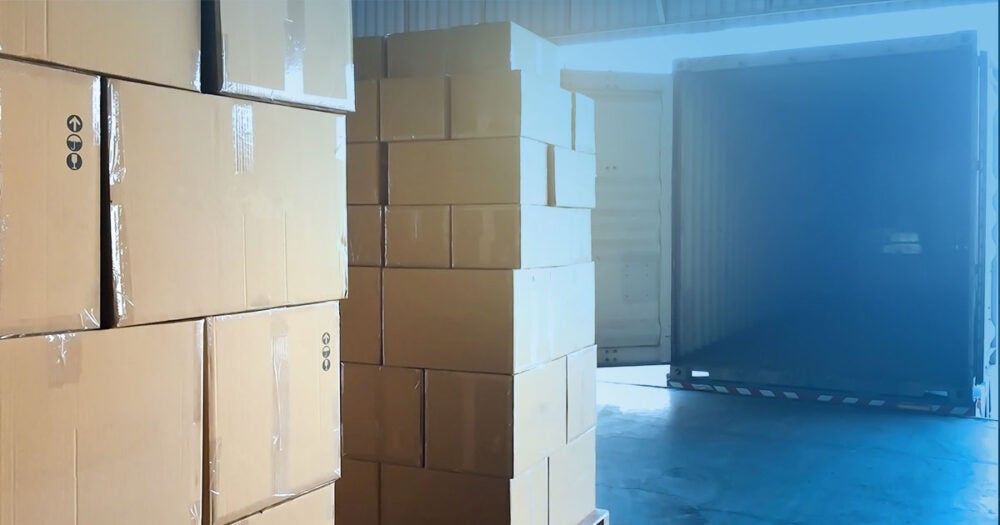For some shippers, freight expenditures are one of the highest costs in their logistics and supply chain operations. There are many complexities and considerations when moving products by freight, and selecting the wrong services and solutions can incur additional expenses.
To reduce spending in this area, companies have looked for ways to improve efficiency, manage all parts of the manufacturing and shipping process, and eliminate all sources of delays. One of the solutions where many of our customers see success is freight consolidation — sometimes known as consolidated cargo or transportation consolidation, among other names.
What is consolidated freight shipping?
Freight consolidation is the process of combining multiple less-than-truckload (LTL) shipments (that are headed to the same location or region) into one full truckload (FTL) shipment. While this is the principle definition of the practice, there are multiple variations of how it works.
For example, all the consolidated LTL freight shipping could come from the same company. Or in many cases, multiple shippers could work together and share space on an FTL truck.
Additionally, the FTL freight carrier could make multiple stops to pick up the LTL loads or could gather them all at a warehouse space shared by multiple shippers.
There are other consolidated freight strategies, too. What's important to remember is that more than one LTL shipment will be sharing space on an FTL truck when leveraging consolidated freight.
6 Advantages of Transportation Consolidation
There are many advantages to implementing consolidated freight into your shipping strategy. In many cases, it can save you money, optimize your supply chain and keep customers happy.
But remember, LTL freight can still have a very important role in your shipping strategy. Sometimes it will just make sense to leverage consolidated freight. Here is a detailed look at six reasons to incorporate it:
- Reduced shipping costs — Typically with FTL freight, you would pay for the entire truck no matter how much space you take up. However, with freight consolidation, you have the opportunity to split costs with other companies that are sharing space on the truck with you.
- Quicker delivery times — FTL shipping stops fewer times and there is far less loading and unloading of products compared to the standard LTL hub-and-spoke distribution process. This allows shipments to arrive faster at their destination.
- Less chance of damage — As mentioned above, LTL freight is handled more often than FTL, which makes it more susceptible to loss or damage. In general, that makes FTL freight shipments safer during transit.
- Minimized emissions — Customers (along with the environment) appreciate your efforts to reduce your carbon footprint. If you implement transportation consolidation, you can add this to your environmental statement on your website and let customers know you do your best to create fuel efficiency by reducing empty space on trucks.
- Improved tracking and delivery forecasting — With fewer trucks involved, leveraging consolidated freight with FTL shipping allows you to avoid multiple tracking numbers. This can make tracking easier, and delivery estimates more accurate. This is particularly true if you partner with a third-party logistics (3PL) with a robust transportation management system.
- Improved customer relationships — When your shipments are delivered faster, more efficiently and with greater tracking capabilities, your customers will be happy. Better services generally mean repeat customers, and freight consolidation can help in this regard.
How a 3PL Can Help With Consolidated Freight
There are many benefits to freight consolidation services, and the six we mention here can definitely bring value to your company. However, implementing a consolidated freight strategy — from point A to Z — can be difficult for many shippers who do not have experience in this area. That's where a 3PL can help.
These logistics partners can enable shippers — particularly those with multiple locations — to compile data, analyze processes and consolidate shipments into full truckloads where possible. They should also have a large network of vetted FTL freight carrier partners and offer a transportation management system to help companies easily navigate the nuances of transportation consolidation.
Lastly, for the convenience of shippers, a 3PL can help you take advantage of unused space among their network of customers who are currently utilizing or are interested in leveraging freight consolidation.
GlobalTranz Can Maximize Freight Consolidation Strategy
GlobalTranz has decades of experience in the logistics industry and helps thousands of shippers of all sizes move products with great efficiency. We are also part of WWEX Group, alongside Worldwide Express and Unishippers. Combined, these three companies make up one of the largest and most diverse 3PLs in the industry, providing shippers with top solutions and financial stability that helps them succeed. Through our full suite of shipping solutions, we ship 48 million shipments annually, and have the resources and expertise to work with companies of all sizes in nearly every industry.
See how GlobalTranz can help you transform your freight shipping with our transportation consolidation solutions. Reach out for a free consultation today!

